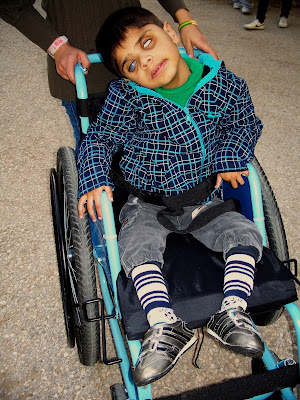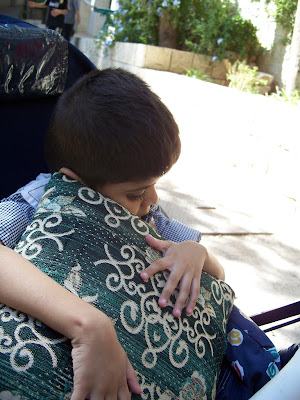Wednesday, May 29, 2013
Sunday, May 26, 2013
A Memorial Day Poem
Inspired by Sigfried Sassoon’s Suicide in the Trenches
and Dexter Filkins’ The Forever War
I
knew a simple Texas boy
who
grinned at life in artless joy.
He
dreamt each night of battles past
and
leapt when Duty called at last.
Fallujah
streets — debris and dirt
and
scraps of flesh and sounds that hurt —
made
not a man, but mindless fiend
that
shot a cat and then itself.
Support
our troops: never forget
that
Lives are saved if we just let
ourselves
remember him before
we
dare to dignify a war.
Wednesday, May 22, 2013
Stitched Together
One week ago, Brother Andrew and 12-year-old Kareem came into my room at 8:00 PM.
Brother Andrew calmly asked, “William, do you want to go to the hospital?”
A pause. Then a smirk. “What kind of hospital?”
A large splinter was embedded in Kareem’s right thigh, close to his groin. We asked him “When?” and he said “Tuesday,” but the injury looked much older than that. His skin completely covered the splinter, and he wasn't in any pain. Something must have happened at home over Easter or even Christmas break, and he didn’t tell anyone for whatever reason, and no one had noticed it (or at least its gravity) until just now.
Our regular Thursday night meeting was about to start. “Yunan will go with you,” Brother Andrew said. Yunan is the 13-year-old son of a Deaf Jordanian Christian couple who work at the school. He speaks Arabic and a fair amount of English.
Five minutes later, Yunan, Kareem, and I made the six-minute walk in the dark to the hospital in Salt. I held Kareem’s hand.
This was my first visit to the hospital. One of my fellow volunteers, a former nurse, recently said, “I would never go there if I needed medical attention.”
Yunan spoke to a man standing at the front door, who instructed us to walk down two flights of stairs. Then Yunan spoke to a woman behind a desk, who pointed us towards an empty room ten feet away. Five minutes later, a man entered the room, and Yunan explained the situation to him. The man directed us to another empty room, where we waited for another five minutes. Then a man who looked more like a physician entered, and Yunan explained the situation once more. The physician’s hands told Kareem to pull down his pants. After inspecting the injury, the physician said a few more words to Yunan and then directed us towards another room. As we were walking to this third room, Yunan said to me, “They’re going to take it out now.”
The room was small. A pulled curtain divided it into two sections. The left one was already occupied. As we entered the right section, we were immediately joined by two physicians. The men motioned Kareem onto one of those long elevated seats, a cross between a bed and a weight-lifting bench. It was pressed against the right wall, a foot away from the far corner. Two low tables were close by, covered with lots of medical instruments. The physicians began rummaging through them.
That’s when Kareem started to cry.
Was your body ever cut open as a child?
Did you receive local anesthesia, so that you were awake to feel the fear?
Could you speak the language of the men who were handling your body?
Did their angry hands crudely tell you to lie down and be still?
While the two men were still rummaging, Yunan told me “I can’t see the blood” and then started to leave the room. I stopped him and asked if he could ask the physicians if it was okay if I held Kareem’s hand during the procedure.
He did. They said yes.
After squeezing into the far corner, I clasp Kareem’s hand once more and place my left hand on his forehead. His anxious eyes look up at me, but only for a second; he is desperate to look down at the large hands that will soon invade his body. They are dabbing his upper thigh with some yellow liquid. He starts to squirm. They speak angrily in Arabic. Pointless. The tears continue as Kareem struggles to sit up. One of the physicians tries to pin down Kareem’s chest with his elbow. My left hand, which was resting on Kareem’s forehead, is now pressing down hard.
Finally, Kareem makes eye contact with me again, and I can sign to him (sloppily, because I’m simultaneously pinning him down).
“It’s very important that you stay still. If you move around, then there will be more problems later.”
“Is there a lot of blood?”
“No, just a little.”
His blood is dripping directly onto the uncovered dark blue seat. A woman on the other side of the room is shouting in pain. In that moment, I am glad that Kareem is Deaf.
Our eye contact is now sustained, and he begins to calm down. My smile is pained at first. But then he smiles back. Knowing that he has derived some comfort from my presence and touch, I now smile freely. My left thumb gently brushes back his hair. I blow him a kiss with no hands. He giggles.
The procedure lasts about ten minutes.
“You did a great job,” I tell him afterwards.
And he did. All five of us did.
Alhamdulillah.
Sunday, May 19, 2013
A Baby Speaker Attempts Big Thoughts
When I catch up with friends from back home, one of the questions that I’m most frequently asked is “How’s your Arabic?”
Well, it sucks.
I took a 4-week crash course when I first arrived, but only half of what I’ve learned has stayed with me these last nine months, and I just haven’t made the time to progress in the language. I know my alphabet and around 150 vocabulary words, which just barely equip me for social survival at shops, on buses, and in the most basic of conversations. But that’s it.
So, while I’m still a beginner (and will almost certainly remain one), I’ve been around the language long enough to make some observations and form some opinions.
On a purely surface level, I’m struck by the beauty of the language.
There are times when it reminds me of French, other times when it reminds me of German, and still other times when it sounds utterly exotic. Like French, Arabic has a lot of elongated vowels and consonants, which are especially nice when spoken softly and romantically. On the other hand, like German, Arabic has several guttural sounds, which are especially nice when spoken loudly and angrily. So, whatever their temperament, Arabs always sound cool to me.
On a deeper level, however, certain features of the Arabic language seem to reveal certain features of Arab cultures.
Of course, we must be wary of generalizations and simplifications, and of course, this approach has its limitations. Even so, the fact remains that languages/dialects reflect, and thus illuminate, aspects of the people groups who speak them.
There are infinitely many illustrations, but here’s one that’s coming to my mind right now: in American English (dunno about those Brits), numerous expressions about time consist of monetary terms: we spend time, we save time, we invest time (usually in relationships, ironically). This observation indicates some sort of connection between time and money as regards our conceptions, values, and/or actions. We would be hard pressed to find many corresponding expressions in the tribal tongues of the Developing World.
So then, what might the Arab language teach us about Arab peoples?
Even an elementary student of Arabic will observe the pervasiveness and centrality of God in Arabic discourse.
A very common response to the question kiffak (How are you?) is alhamdulillah -- praise be to God.
A common expression of happiness, often spoken after hearing exciting news, is ma shah allah (abbreviated mah shallah) -- whatever God wills.
In situations when English speakers say “hopefully,” Arabic speakers say inshah allah (abbreviated inshallah) -- if God wills.
And actually, Arabic speakers will also say inshallah in situations when English speakers would typically say “I hope so” or “I’d like that.” Don’t miss the beauty and the theological richness: to use the word in this way is to implicitly assert that what a person wants and what God wills should be the same thing.
In addition to language of God, language of peace permeates Arabic discourse.
There are quite a few common phrases that include the word salahm or one of its variants. Many of us are already familiar with salahm alaykum -- Peace be upon you [all].
It’s worth noting that many if not most Arab Christians do not use this particular phrase because of its association with the wider Muslim community. Even so, Arab Christians probably say salahm more often than we say “peace.”
...which reminds me that, from what I’ve learned, the vast majority of Arab churches profess pacifistic faith convictions.
They don’t just say it more often.
Alhamdulillah.
Wednesday, May 15, 2013
Sunday, May 12, 2013
Our Little Prince
How could I have been blogging for this long and
not yet told you about little Mohammed?
I’ve only worked one-on-one with Mohammed for
about ten hours total this year. Seriously, ten of my happiest hours in Jordan
so far. There’s something special about this boy, whose body is utterly
vulnerable, but whose spirit is strikingly serene.
Here’s an excerpt from a piece that I wrote for
my host organization.
“He’s our
little prince,” says Tamara, a long-term volunteer at the Holy Land Institute
for the Deaf. Indeed, seven-year-old Mohammed attracts attention wherever he
goes on school grounds. Many of the Deaf students are eager to give him a hug,
gently pinch his nose, or kiss him on the cheek.
But this
adorable little boy has not always been so warmly received. Like many Deafblind
children in Jordan (and much of the world), Mohammed was regarded not as a
blessing, but as a source of shame for his family. Thus, he has suffered from
serious neglect. For example, before he arrived at the Holy Land Institute for
the Deaf (around a year and a half ago), Mohammed had never received any form
of nourishment other than plain milk.
The path
towards physical and social development will be long and arduous for Mohammed.
His obstacles include malnourishment, immobility, tactile defensiveness
(recoiling from all touch), and the absence of communication skills. Slowly but
surely, however, he is making progress. Mohammed can now sit up straight on his
own strength and put some weight on his feet. In addition, he has largely
overcome his tactile defensiveness; if approached properly, Mohammed is
receptive to anyone.
And thankfully,
here at the Holy Land Institute for the Deaf, there are many people for him to
receive – and who joyfully receive him.
Subscribe to:
Posts (Atom)


















